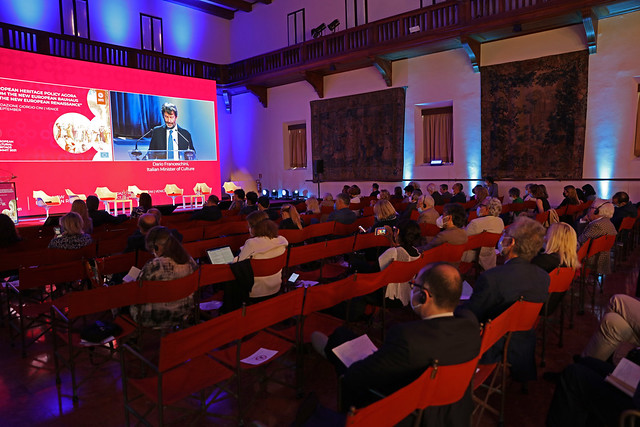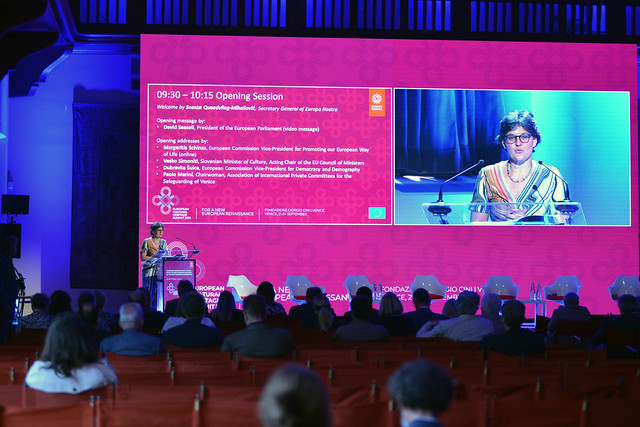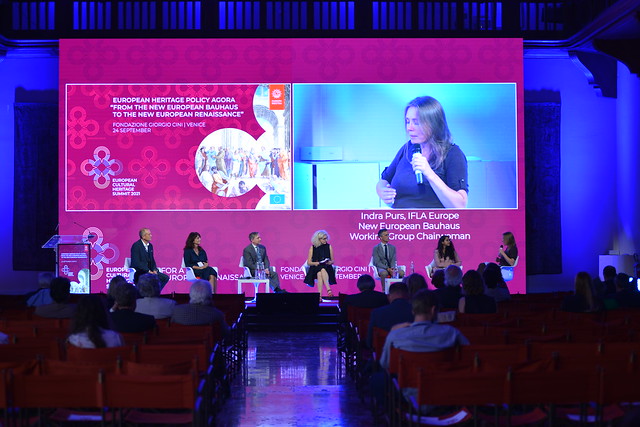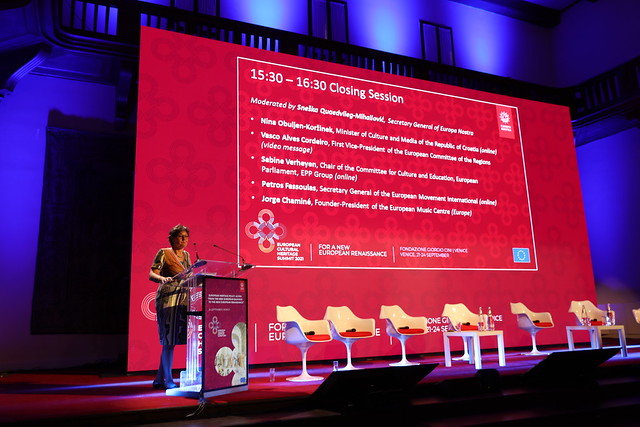European Heritage Policy Agora in Venice addresses the most topical issues for the cultural heritage ecosystem
The European Heritage Policy Agora “From the New European Bauhaus to the New European Renaissance” was one of the highlights as well as the closing event of the European Cultural Heritage Summit 2021 held from 21-24 September in Venice. The Policy Agora brought together policy-makers at all levels of governance and key heritage stakeholders to reflect on the most topical issues for the cultural heritage ecosystem in Europe, including, among others, the European Green Deal, the New European Bauhaus, the role of cultural heritage in the EU’s external relations and the Conference on the Future of Europe.
The European Heritage Policy Agora was a unique opportunity to put forward innovative, concrete and bold solutions for a better and more sustainable future together. The Venice Call to Action: “For a New European Renaissance” was presented on this occasion. It makes a strong plea to European leaders at all levels of governance as well as to all heritage actors to duly integrate the transformative power of culture and cultural heritage among the strategic priorities for the reshaping of our societies. The Venice Call to Action puts forward 12 concrete and actionable proposals – as a direct contribution by Europa Nostra and its network – that aim at unleashing the potential of cultural heritage for the European Green Deal, the New European Bauhaus and the forthcoming 2022 Year of European Youth, among other key priorities of the European Union, as well as the United Nations’ Sustainable Development Goals.
The Policy Agora gathered 41 high-level speakers from 20 different countries in Europe and beyond – representatives of EU institutions, Italian and European policy-makers active at local, regional and national level, representatives of heritage institutions and private foundations, young heritage professionals as well as cultural and heritage operators. The Policy Agora, held at the headquarters of the Giorgio Cini Foundation in the iconic setting of San Giorgio Maggiore Island, was attended by some 300 on-site and online participants.
Through five inspiring sessions – three thematic panels as well as opening and closing sessions -, the Policy Agora addressed different timely topics, putting forward concrete proposals and solutions, highlighting major challenges and sharing good practices. The five sessions covered the following subjects:
1. Opening session
As Europe seeks to build back better in the post-pandemic future, invited speakers reflected on the following questions: What could we envisage for this new chapter of our shared European history? How to achieve a more sustainable and inclusive future of the European project and what role can cultural heritage play in it? What can be the contribution of cultural heritage to the Conference on the Future of Europe?
The session was opened with a powerful video-message by David Sassoli, President of the European Parliament, and followed by addresses by Margaritis Schinas, European Commission Vice-President for Promoting our European Way of Life, Vasko Simoniti, Slovenian Minister of Culture and Acting Chair of the EU Council of Ministers, Dubravka Šuica, European Commission Vice-President for Democracy and Demography, and Paola Marini, Chairwoman of the Association of International Private Committees for the Safeguarding of Venice. A special address was delivered by Dario Franceschini, Italian Minister for Culture. The session was moderated by Sneska Quaedvlieg-Mihailović, Secretary General of Europa Nostra.
Read more about the opening session here.
2. Cultural Heritage at the Heart of the European Green Deal
This panel deepened the conclusions and recommendations introduced by the pioneering European Cultural Heritage Green Paper “Putting Europe’s shared heritage at the heart of the European Green Deal“, produced by Europa Nostra in cooperation with ICOMOS and the Climate Heritage Network and with the support of the European Investment Bank Institute. It addressed the role and potential of cultural heritage for the success of the European Green Deal and the need to create synergies between relevant European policies and actions related to the built environment and the green renovation wave.
The session was opened with a statement by Francisco de Paula Coelho, Dean of the European Investment Bank Institute, and followed by interventions from Andrew Potts, Coordinator of the Climate Heritage Network, Alexandra Mitsotaki, President and Co-founder of the World Human Forum, Oliver Martin, Head of Section, Federal Office of Culture, and Pravali Vangeti, European Heritage Youth Ambassador, Europa Nostra/ESACH. Reactions from Iskra Mihaylova, Member of the European Parliament and Vice-Chair of the Renew Group, Philippe Gimet, CEO of OPEREL, Xavier Troussard, Head of Unit in charge of the New European Bauhaus at the Joint Research Center of the European Commission, and Indra Purs from IFLA Europe – European Region of International Federation of Landscape Architects followed. The session was moderated by Erminia Sciacchitano from the Cabinet of the Italian Minister of Culture.
Read more about this panel here.
3. Cultural Heritage, a catalyst for Peace and Mutual Understanding
This session focused on the role of cultural heritage in Europe’s relations with its partner countries and as a vector for peace-building, reconciliation and international cooperation. It was a follow-up to the Conclusions on EU Approach to Cultural Heritage in conflicts and crises adopted by the Council of the European Union in June 2021 (read related news item), which recognises the role of cultural heritage as an important vehicle for peace, democracy and sustainable development by fostering tolerance, mutual understanding, reconciliation as well as intercultural and interfaith dialogue.
The session was opened with a statement by Stefano Sannino, Secretary General of the European External Action Service (EEAS), and followed by interventions from Karen Brown, Senior Lecturer in Art History and Museum and Heritage Studies, University of St Andrews, Scotland, Guy Clausse, Executive Vice-President of Europa Nostra, Antigoni Michael, Heritage Professional, Archaeologist and European Heritage Youth Ambassador, Vesna Marjanović, Secretary General of Europa Nostra Serbia, and Julia Lagahuzère, General Director of Opera for Peace. After these initial interventions, reactions from Gijs de Vries, Senior visiting fellow at the London School of Economics and Political Science, Valéry Freland, Executive Director of the International alliance for the protection of heritage in conflict areas (ALIPH), and Salima Yenbou, Member of the European Parliament followed. The session was moderated by Jimmy Jamar, Head of the Europa Nostra Brussels Office.
Read more about this panel here.
4. Culture and Heritage as the basis of a New European Renaissance
This panel opened the perspectives for a broad discussion on the future of the European project altogether, where culture and cultural heritage would be seen as a vector irrigating all future goals and priorities of the EU. It was a direct contribution to the ongoing Conference on the Future of Europe, also coinciding with its Plenaries and European Citizens’ panels. The panel gathered proposals and ideas to craft a new vision for the entire European project.
The session started with an inspiring opening video message by Roberto Cicutto, President of La Biennale di Venezia. Interventions by Marshall Marcus, Secretary General of the European Union Youth Orchestra, Silvia Costa, Extraordinary Commissioner for the Italian Government for the restoration of the Santo Stefano prison and former MEP, Basil Kerski, Director of the European Solidarity Centre, and Hana Kohout, Project Assistant at Culture Hub Croatia and European Heritage Youth Ambassador followed. After the initial interventions, Marcos Ros, Member of the European Parliament and Founder of the New European Bauhaus Friendship Group in the European Parliament, and André Wilkens, Director of the European Cultural Foundation reacted to the contributions of the previous speakers. The session was moderated by Luca Jahier, Former President of the European Economic and Social Committee.
Read more about this panel here.
5. Closing session
During an inspiring closing session, speakers shared their vision on how to unleash the potential of cultural heritage for Europe’s society, economy and the environment in a post-pandemic future. The closing session addressed the following questions: How can we shift from a sectoral to a holistic perspective, where culture and heritage are considered powerful elements to achieve all of Europe’s key priorities? How can we place culture and cultural heritage where they belong: at the very heart of the European project?
The closing session gathered the powerful contributions of Nina Obuljen-Koržinek, Minister of Culture and Media of the Republic of Croatia, a video message by Vasco Alves Cordeiro, First Vice-President of the European Committee of the Regions, Sabine Verheyen, Chair of the Committee for culture and education, European Parliament, Petros Fassoulas, Secretary General of the European Movement International, and Jorge Chaminé, Founder-President of the European Music Centre. The session was moderated by Sneska Quaedvlieg-Mihailović, Secretary General of Europa Nostra.
During the closing session, the Secretary General of Europa Nostra presented the Venice Call to Action: “For a New European Renaissance”, which encapsulates the key policy conclusions of the European Cultural Heritage Summit in Venice.
Read more about the closing session here.
More information
Watch the full videos of the Policy Agora (Part I and Part II).
Read the Policy Agora Programme booklet. The programme booklet only exists in electronic version. Every unprinted booklet helps the environment.












